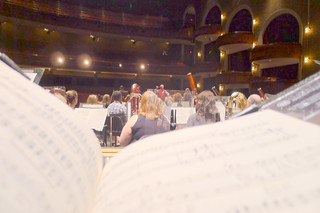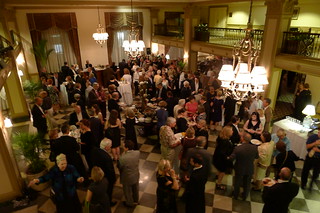To Joy
Joy, thou beauteous godly lighting,
Daughter of Elysium,
Fire drunken we are ent’ring
Heavenly, thy holy home!Thy enchantments bind together,
What did custom stern divide;
Every man becomes a brother,
Where thy gentle wings abide.
Be embrac’d, ye millions yonder!
Take this kiss throughout the world!
Brothers—o’er the stars unfurl’d
Must reside a loving father.–Friedrich Schiller, 1786
Last night the Greenville Chorale joined forces with the Greenville Symphony Orchestra for a performance of Beethoven’s 9th Symphony. The 9th is one of my favorite pieces, and I’ve had the privilege to perform it once before. Last night’s performance, though was one of the most stirring I’ve ever experienced.
For the Chorale, the piece came together fairly quickly. Many of us were familiar with the music, but also the chorus doesn’t sing that much in the concert. We’re only there for the last half of the last movement of the piece – about 20 minutes worth. Bing Vick often let us out of rehearsals early, which was a nice change of pace.
However, that is a VERY challenging 20 minutes. First there is the range. The piece is written at the extreme upper vocal range for all parts. I can’t think of another piece that has the basses singing a high F as many times and as long as this one does. Then there was the tempo set by Maestro Tchivzhel – fast, then blindingly fast. We had to squeeze a mouthful of German syllables into such a fast pace that I don’t think any of us got all of the words correct, even in the final performance. Oh, yeah, they had to be on the right pitches and at the right dynamic, too. It was a bear.
Two weeks ago we began working with Maestro Tchivzhel in rehearsal. This piece’s themes of freedom and universal brotherhood have special meaning for him, having defect from Russia in 1991. From Wikipedia…
In 1991,during a month-long tour with USSR State Symphony, Tchivzhel told his host in Greenville, South Carolina, that he wanted to defect to the United States. To insure that he would have a better chance at receiving political asylum, a local attorney arranged for him to make uncomplimentary public comments about the Soviet Union to an obscure agricultural newsletter. When the symphony left from its last stop in Washington, DC, to return to Moscow, Tchivzel was whisked away by armed FBI and Immigration and Naturalization Services agents. He and his wife became U.S. citizens in 1999. At each symphony performance in Greenville, he faces the audience to conduct “The Star-Spangled Banner.”
Even though Vick had prepare us for the fast tempi Tchivzhel would take, he still had lots of fine tuning. Listening to his heavy Russian accent and halting English was a challenge – Tchivzel has very specific ideas about how the music should sound, and these often are quite different from a purely chorale interpretation of the piece. Also, Tchivzhel is known for using very dramatic conducting cues, and these are often hard to translate into effective vocal production.
Somehow, though, we managed to get close enough to his music concepts, and Thursday evening we joined the GSO for our first joint rehearsal. I am usually on the front row, right next to the tympani and behind the trombones, which is fortunate because the trombones often double our part.
Even though there were the usual occasional glitches, all of our rehearsals with orchestra went very well. We had another rehearsal Friday night, with dress rehearsal Saturday morning. Saturday morning, as has gotten to be tradition, several of our group gathered for breakfast at Soby’s on the Side before heading to the Peace Center.
Hearing the piece in the hall with the orchestra, there were three sections of the piece that really stand out for me. The fourth movement opens with dissonance, a clash of ideas that continues through the first section, with hints of the “Ode to Joy” theme entering. The dissonance enters again, to be interrupted by the bass soloist declaiming, “O Freunde, nicht diese Töne!”, or, “O friends, not these sounds! Let us strike up more pleasant sounds and more joyful!” At that point the soloist launches into Schiller’s Ode to Joy.
The second dramatic point comes after an extended orchestral section. The chorus bursts into a boisterous rendition of the Schiller theme at full volume. The third section that always gets to me is the double fugue section.
Saturday night’s performance was spectacular. I love the whole 9th Symphony, especially the second movement. We got to hear it as we waited in the wings just off-stage. Right before the third movement we went on-stage, so we got to hear the third, calmer movement before it was our time to sing.
At the end of the piece there was immediate, thunderous applause. We had multiple curtain calls, and the applause seemed like it wouldn’t end. Because we had entered in the middle of the concert with the house lights down, we hadn’t been able to see that the Peace Center was packed. It was truly a stirring, emotional experience.
We capped off the evening with a very nice party/reception downtown at the Poinsett Hotel.
Today we repeat the performance this afternoon. I just hope we can sustain the same intensity. It should still be a great concert – there may still be tickets, so come on out!



We did. I was glad we didn’t have the extended wait today before going in. I was worried about fatigue; but, if anything, today’s performance was even stronger than Saturday night’s. It’s funny; as soon as I got into the wings and could hear the orchestra in the 2nd movement, it was like entering another world. Kind of a reality check, I suppose.
It’s really a humbling experience to get to participate in something like this. But also an uplifting one. Unbelievable …